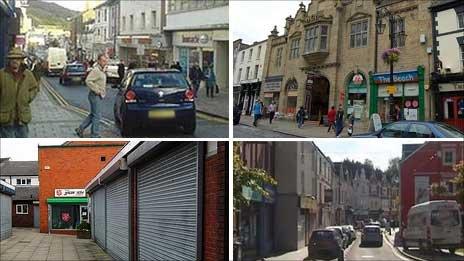Nightlife hopes for Wales town centre regeneration
- Published

The British Retail Consortium says Wales' high street footfall fell 9.2% over the last 12 months
Town centres must capitalise on the night-time economy to revive the fortunes of high streets, it has been claimed.
The proposal is being put to a Welsh Assembly inquiry looking at ways to regenerate town centres.
A group representing town managers says making sites more popular out of hours could bring an additional dimension to the high street.
The enterprise and business committee will hear from business leaders later.
Martin Blackwell, chief executive of the Association of Town Centre Management (ATCM), is giving evidence, external on behalf of a dozen town centres, including Aberystwyth, Caerphilly, Cardiff, Colwyn Bay, Merthyr Tydfil, Neath, Newport, Risca, Swansea and Wrexham.
Mr Blackwell said high streets "used to be about retail but now it's about public services, tourism, arts and culture, and longer than 9-5".
"They are 24-hour places and have an important night-time economy," he said.
Resist pressure
In July the enterprise and business committee asked for people to give their views to the inquiry, which is now starting to hear representations in person.
Among dozens of groups and individuals taking part, external is the Welsh Local Government Association (WLGA), which represents Wales' 22 local authorities.
Its feedback to the committee, external says: "The greater ease of (free) parking, avoidance of town centre congestion and ability to carry a wide range of products in large stores has made out-of-town development popular with the general public.
"Although government policy has sought to protect town centres, local authorities working in accordance with the national policy have nevertheless often found it hard to resist pressure for out of town development."
Newport council, external confirms a reduction in city centre trade due to out-of-town stores, and Wrexham council , externalhas also given written evidence, calling for an all-party parliamentary group to be formed to work with town centre managers, the ATCM and the National Market Traders Federation.
It says: "The business sector cites two areas that impact on their businesses in town centres. These are traffic management including car parking and signage.
"The ability for visitors to access the town centre easily, affordably and to then navigate their way around the town without feeling frustrated or lost is paramount."
'Rescue Wales'
It calls for research into the use of business rates and ringfencing so town centre partnerships have funds to take responsibility for improving their business environment as is happening in Swansea which has developed a Business Improvement District, external (BID).
The Federation of Small Businesses in Wales (FSB), which is also giving evidence, external on Thursday, wants "fairer business rates" and "better planning laws and incentives" such as free or cheap parking to help its 10,000 members and to "rescue Wales' town centres from the spectre of empty shops and further decline".
"It is better to lower business rates to an affordable level than stick to current rates and have lower levels of occupancy," says Janet Jones, chair of the FSB Welsh Policy Unit.
High street chain Boots UK has also joined the debate, external quoting the UK town centre vacancy rate, which was 11.2% in May 2011 and 13.4% in Wales.
It goes on to say the problem is compounded by the "higher than average proportion of the population relying on state benefits in some parts of Wales will also have an increasingly detrimental effect on the viability of town centres in these areas".
And that view is endorsed by Narberth Chamber of Trade, external which says: "A high street needs a suitably large and wealthy customer base to support independent retailers.
"The less wealthy tend to be less discerning, and will buy from the cheapest provider, rather than intentionally buying local (there are no doubt exceptions to this)."
Trade association the British Retail Consortium (BRC) reported in August, external that footfall on high streets had dropped 2.6% over the last 12 months with the hardest hit locations being Wales (-9.2%), the West Midlands (-6.6%) and the East of England (-6.2%).
"Retailing not only drives the Welsh economy, its health is a visible barometer of the economic climate," it says in its written representation to the assembly, external.
- Published29 September 2011
- Published25 July 2011
- Published2 July 2011
- Published20 June 2011
- Published17 June 2011
- Published26 March 2011